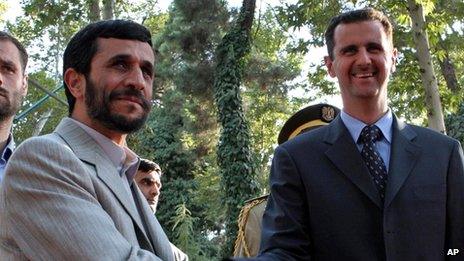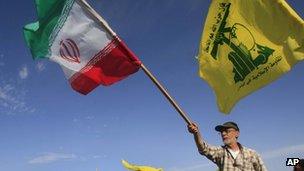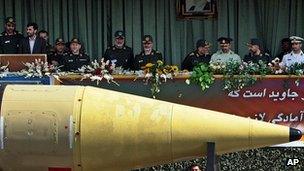Iran and Syria: Alliance of shared enemies and goals
- Published

The US accuses Iran of directly helping President Assad in the current crisis
Iran and Syria make for strange allies. Iran's Supreme Leader, Ayatollah Ali Khamenei, leads a religious administration. Syria's President Bashar al-Assad heads a secular and socialist government.
One country is Persian, the other Arab. But since Iran's 1979 Islamic Revolution, the two have found reason to stick together.
"The Iran-Syria alliance grew out of common cause - and common enemies," writes Professor Jubin Goodarzi in <link> <caption>The Iran Primer</caption> <url href="http://http://iranprimer.usip.org/resource/iran-and-syria" platform="highweb"/> </link> .
"Their common strategic goals have held the alliance together for three decades, despite repeated attempts to rend them apart."
Historically the two countries came together in order to fight against a common rival, Saddam Hussein's Iraq; to check Israeli advances in Lebanon; and to prevent any American attempts to enter the Middle East.
In particular, the two countries united to provide support to the Lebanese armed Shia movement, Hezbollah, and to the Palestinian Islamist militant groups, Hamas and Islamic Jihad.
Problem or solution?
Diplomats trying to end the fighting inside Syria recognise the influence that Iran has upon its ally.
Kofi Annan, the joint UN-Arab League envoy to Syria, says that discussions are taking place about establishing a contact group made up of countries able to influence both sides in Syria. Mr Annan says that he hopes that Iran can be "part of the solution".
But the US Permanent Representative to the United Nations, Susan Rice, has called Iran "part of the problem".
The United States accuses Iran of providing direct assistance to President Assad's government.
Officials say that Iran has sent advisers to Syria and has provided riot gear and surveillance equipment to Syrian security forces.

Lebanon's Hezbollah is one cause that unites the Syrian and Iranian governments
Sanctions on interference
The Obama administration has already taken action against a number of Iranian security officials.
On 18 May 2011, the US Treasury Department sanctioned General Mohsen Chizari of Iran's Islamic Revolution Guards Corps (IRGC) for helping the Syrian government repress protests.
The IRGC was set up shortly after the 1979 Iranian revolution to defend the country's Islamic system, and to provide a counterweight to the regular armed forces.
A month later, US sanctions were imposed on two Iranian national police officials, Ismail Ahmadi Moghadam and Ahmad-Reza Radan.
<link> <caption>The US government said</caption> <altText>http://www.treasury.gov/press-center/press-releases/Pages/tg1224.aspx</altText> <url href="http://www.treasury.gov/press-center/press-releases/Pages/tg1224.aspx" platform="highweb"/> </link> that Mr Radan had travelled to Damascus in April 2011, "where he met with Syrian security services and provided expertise to aid in the Syrian government's crackdown on the Syrian people".
On 6 February 2012, Israel's Haaretz newspaper reported that Gen Qassem Suleimani, the commander of IRGC's elite overseas operations arm, the Quds Force, had gone to Syria and taken up a position in what the newspaper described as a "war room" which managed Syrian army manoeuvres against opposition forces.
Iran quickly denied the allegation. The next day the government's Foreign Ministry spokesman, Ramin Mehmanparast, said that Iran was "in no way" interfering in Syria's affairs.
"Interference by other countries in the Syrian affairs, we consider that to be a wrong move that can endanger serenity and security in that country," Mr Mehmanparast told reporters.
"The allegations levelled at our country are aimed at pushing the atmosphere inside Syria towards chaos, and we do not find such measures and comments to be right."
'Men with beards'
Opposition groups in Syria have been trying to provide visible proof of Iranian soldiers inside Syria.
On 25 April, <link> <caption>a video</caption> <url href="http://http://www.youtube.com/watch?v=bBdGXh0lSYg" platform="highweb"/> </link> posted on YouTube allegedly showed four men in military fatigues outside a building. Two of them are seen with facial hair.
The video claims that since beards are forbidden in the Syrian army, the soldiers must be from Iran. But other observers believe that this point is far from proven.

US sanctions have been imposed on some Iranian officials for involvement in Syria's uprising
More conclusive, perhaps, may be an interview given by Ismail Gha'ani, the deputy head of Iran's Quds force to Iran's semi-official Isna news agency on 27 May 2012.
"If the Islamic republic was not present in Syria, the massacre of people would have happened on a much larger scale," the general is quoted as saying.
"Before our presence in Syria, too many people were killed by the opposition but with the physical and non-physical presence of the Islamic republic, big massacres in Syria were prevented," he added.
The interview was quickly removed from the website. And Iran repeated its denials of direct involvement inside Syria. But the alliance between the two countries remains in place.